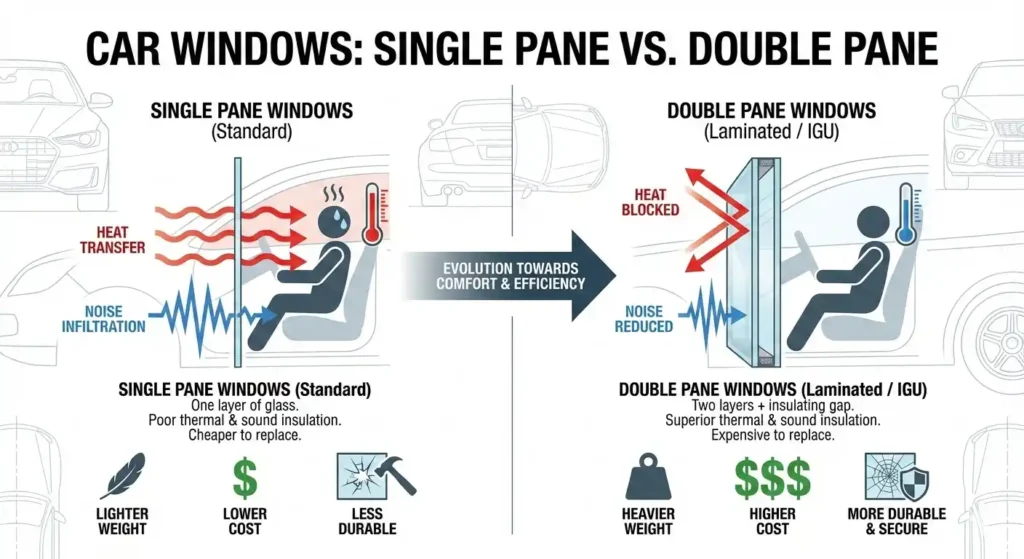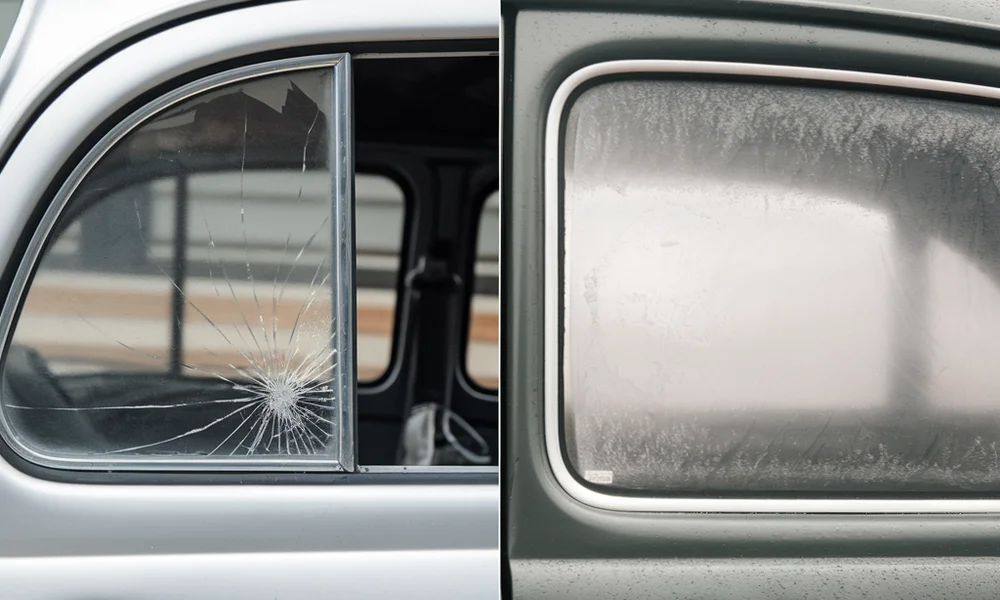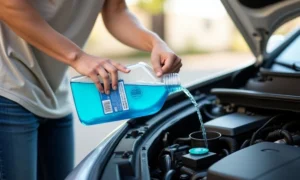Choosing between window types for your car affects comfort, cost, and safety. Most drivers don’t think about their windows until there’s a problem. But understanding the difference can save you money and keep you comfortable year-round.
Single Pane Vs Double Pane Windows is a common question when replacing car glass. Single pane windows use one layer of glass while double pane windows have two layers with an air gap between them. This simple difference changes how your car handles temperature, noise, and energy costs.
What is Single-Pane Car Windows

Single pane windows are the standard for the auto world. Most cars on the road use this type of glass. It is made from a single sheet of tempered glass. Tempered glass is very strong. Manufacturers heat the glass and then cool it very fast. This process makes the glass hard.
When this glass breaks, it turns into small, blunt pieces. This is a safety feature. It prevents large, sharp shards from hurting people in a crash. Single pane windows are light. This helps the car stay fast and save on gas.
These windows are great for basic needs. They protect you from wind and rain. They are also very clear. You can see the road without any distortion. Most people are happy with single pane glass. It is the most affordable way to build a car. However, it does not block much heat. It also lets in a lot of noise from the road.
What is Double-Pane Car Windows
Double pane windows use two layers of glass. These layers have a thin piece of plastic between them. This plastic is often called PVB. It acts like glue to hold the glass together. This design is called laminated glass.
In the past, only windshields were laminated. Now, many high end cars use it for side windows too. People also call these double pane car windows. The main goal of this glass is to stop noise. It creates a barrier that sound waves cannot easily pass through.
This glass is much thicker than a single sheet. It feels solid and heavy. If it breaks, the plastic layer keeps the glass in one piece. This makes it much harder for someone to break into your car. It also keeps you safer during an accident. The glass will not fly everywhere.
Single Pane Vs Double Pane: Key Differences

The main difference between single and double pane window types is structure. Single uses one glass layer. Double uses two with a gap between.
Temperature Control
Single pane windows let heat pass through easily. Your car heats up faster in summer and cools down faster in winter.Dual pane car windows trap air between layers. This slows heat transfer in both directions. Your car stays cooler in heat and warmer in cold.
Noise Reduction
Single pane windows block basic noise. You’ll still hear traffic, wind, and road sounds clearly.Double pane windows car models reduce noise better. The air gap absorbs sound waves. This cuts down on highway noise and city sounds.
Weight and Fuel Impact
Single pane windows are lighter. Less weight means slightly better fuel economy.Cars with double pane windows add extra pounds. This can reduce fuel efficiency by a small amount. Most drivers won’t notice the difference.
Installation Complexity
Single pane windows are easier to install. Most shops can handle them without issues.Double pane windows need careful handling. The seal must stay intact. This requires more time and skill.
Condensation Issues
Single pane windows can fog up easily. Temperature differences cause moisture to form.Double pane windows resist condensation better. The air gap prevents cold outside air from reaching the warm inside surface.
Which One is More Energy Efficient?

Energy efficiency is a major win for double pane glass. Glass is not a good insulator. Heat moves through it very fast. In the summer, the sun bakes your car. In the winter, the cold air chills the cabin.
Single pane windows offer very little protection. Your air conditioner has to work hard to stay cool. This uses more gas or battery power. If you have an electric car, this can lower your range.
Dual pane car windows act like a shield. The plastic layer and the extra glass block the heat. This keeps the cabin at a steady temperature. You will not feel the “oven effect” as much when you get in your car on a hot day.
For people in places like Texas, this is a lifesaver. It keeps the sun from burning your skin through the glass. It also protects your seats from fading. UV rays are blocked more effectively by the double layers. This means your car stays looking new for longer.
You can also read about Windshield replacement in Austin Texas.
Cost Comparison: Single Pane Vs Double Pane Windows
Price is where these two types differ the most. Single pane windows cost much less than double pane options.
Single Pane Windows Cost
A typical single pane car window replacement runs $200 to $500. This includes the glass and installation labor.
Side windows are usually cheaper than windshields. Rear windows fall in the middle. The exact price depends on your car model and where you live.
Most insurance policies cover single pane replacement. Your deductible might be $100 or less. Some states require zero deductible for glass.
Double Pane Windows Cost
Double pane car windows cost $500 to $1,200 per window. The price jumps because of materials and labor.Installation takes longer too. Technicians must handle the sealed unit carefully. Any damage means ordering a new window.Finding replacement double pane windows is harder. Not all shops stock them. You might wait days or weeks for the right part.
Insurance coverage varies for double pane windows. Some policies treat them like standard glass. Others might not cover the extra cost.
Long-Term Value
Single pane windows offer good value for most drivers. They’re cheap to replace and widely available.Double pane windows might save money over time. Lower energy use means less spent on fuel or electricity. The payback period can take years though.
For most people, a single pane makes financial sense. Only choose a double pane if you value quiet and comfort over upfront cost.
Durability and Maintenance
Both window types last about the same time with proper care. Glass quality matters more than the number of panes.
Single Pane Durability
Single pane windows handle daily wear well. They resist scratches and chips from normal use.Extreme temperature changes can stress single pane glass. Rapid heating or cooling might cause cracks. This is rare but possible.Cleaning single pane windows is simple. Use standard glass cleaner on both sides. No special products needed.
Double Pane Durability
Double pane windows face one extra risk. The seal between glass layers can fail. When this happens, moisture gets trapped inside.Foggy windows mean seal failure. You’ll see condensation you can’t wipe away. The only fix is replacing the entire window unit.
Seal failure usually takes years to develop. Quality double pane windows can last 10 to 20 years. Cheaper versions might fail sooner.Cleaning double pane windows requires care. Use gentle cleaners. Harsh chemicals can damage the seal over time.
Maintenance Tips
Check window seals regularly for both types. Look for gaps or cracks around the edges.Park in shade when possible. This reduces stress from heat. It also protects window tinting and seals.Clean windows monthly. Remove dirt and debris that can scratch glass. This keeps visibility clear and glass in good shape.
Benefits of Each Window Type
Each option has advantages depending on your needs and budget.
Single Pane Benefits
Cost-effective for most situations. You’ll save hundreds per window compared to double pane.Easy to replace almost anywhere. Most auto glass shops carry common single pane windows in stock.Lighter weight helps with fuel economy slightly. Every pound matters for efficiency.
Simpler design means fewer parts to fail. No seals to worry about between glass layers.Perfect for mild climates where extreme temperatures aren’t common. They provide adequate protection and comfort.
Double Pane Benefits
Superior temperature control keeps your car more comfortable. Less heat gain in summer and less heat loss in winter.Significant noise reduction improves the driving experience. Road noise drops noticeably on highways.Better for electric vehicles where range matters. Less climate control use means more miles per charge.
Adds a luxury feel to any vehicle. The quiet cabin creates a premium atmosphere.Can increase resale value on higher-end vehicles. Buyers appreciate the upgrade.
Final Thoughts
Your choice between single pane vs and double pane windows depends on priorities. Single panes work great for most drivers. It’s affordable, available, and gets the job done. Double pane makes sense if you want maximum comfort and can afford the higher price.
Think about your climate and budget. Hot or cold weather year-round makes double panes more valuable. Moderate weather means a single pane is usually enough.
If you need Car Window Replacement in Austin, The team at Texas Reliable Auto Glass can help you choose the right option. They work with both types and explain your choices clearly.
Most cars come with a single pane as standard. This tells you it meets basic needs well. Upgrading to a double pane is a luxury choice, not a necessity.
Consider how long you’ll keep your car too. If you’re selling soon, stick with a single pane. The extra cost of a double pane won’t pay off in resale value.
FAQs
What is the main advantage of double pane windows?
Better temperature control and noise reduction. The air gap between glass layers blocks heat and sound more effectively than a single pane.
Are single pane windows safe?
Yes. Both types meet federal safety standards. Single pane uses tempered or laminated glass that protects you during accidents.
How much more do double pane windows cost?
About two to three times more than a single pane. Expect to pay $500 to $1,200 per window versus $200 to $500 for single pane.
Can moisture get trapped in double pane windows?
Yes, if the seal fails. This causes permanent fog between glass layers. The only fix is replacing the entire window unit.
Do luxury cars always have double pane windows?
Not always. Some luxury models use them, especially in rear windows. Most still use a single pane inside windows to save weight.
Which type is better for cold climates?
Double pane windows keep heat inside better. They reduce windshield frost and make winter driving more comfortable.








